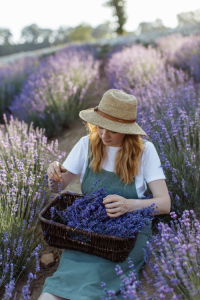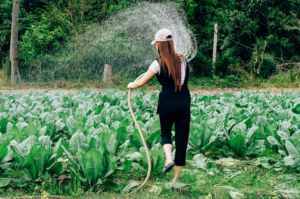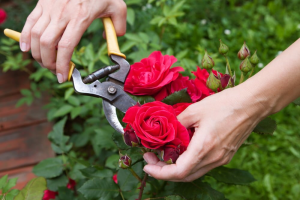Gardens are a sanctuary, a place of beauty and tranquility, where we can connect with nature and enjoy the fruits of our labor. However, this peaceful haven can quickly turn into a battleground when squirrels enter the scene.
Squirrels, with their acrobatic abilities and insatiable appetite, can cause significant damage to our gardens. They dig up bulbs, nibble on tender plants, raid bird feeders, and can even gnaw on wooden decks and outdoor furniture. Their activities not only cause physical damage but can also lead to a decrease in the diversity and abundance of flora in our gardens.
Moreover, squirrels can carry diseases that are harmful to other wildlife and even humans. By preventing squirrels, we’re also helping to maintain the overall health and wellbeing of our garden ecosystem.
Therefore, it’s crucial that we take steps to prevent squirrels in our gardens. Not only will this ensure the survival and prosperity of our plants, but it will also allow us to continue enjoying the peace and beauty that a well-maintained garden brings. In the following sections, we’ll explore various methods to prevent squirrels from wreaking havoc in our gardens. Let’s embark on this journey to safeguard our gardens and coexist peacefully with nature.

Cayenne Pepper: A Spicy Deterrent
Indeed, squirrels can be deterred by using a blend of cayenne or other chili peppers in a spray or sprinkling it around plants. However, if it lands on their paws and they touch their eyes, it can cause discomfort and even temporary blindness. Therefore, we recommend methods that are less harmful to prevent squirrels.
Mothballs: A Toxic Solution
People have suggested mothballs as a squirrel deterrent. However, mothballs are toxic when ingested, posing a risk not only to squirrels but also to pets and children. Therefore, we advise against their use to prevent squirrels.
Traps: A Temporary Fix
While you might consider squirrel traps a good idea, especially if you’re keen to prevent squirrels, they usually aren’t a long-term solution. Trapping often leads to a never-ending cycle and just opens up space for more squirrels to move in. Traps also risk separating a mother squirrel from her offspring, particularly in spring, leaving them with no survival chance. This practice is also prohibited in many areas, so check with your local Department of Fish and Wildlife first.
Bird Feeders and Bulbs: A Squirrel’s Delight
Squirrels are fond of the same nuts and seeds that birds eat, and fall-planted bulbs are a delicacy when squirrels are actively preparing for winter. Here are some strategies to prevent squirrels from feasting on your bird feeders and bulbs.
Bird Feeders:
- Use a squirrel-proof bird feeder or add squirrel guards or baffles to existing feeders and poles.
- Keep the area under the bird feeder clean and free of dropped seeds and nuts.
- Place feeders at least 5 to 6 feet off the ground and at least 8 to 10 feet away from any structure (house, fence, shed) that they can use as a launching pad to jump to the feeder.
- Prune trees to keep branches far enough away.
- Feed safflower seeds — the birds like them, but squirrels don’t.

Bulbs:
- Line the bottom, sides, and top of the bulb planting area with hardware cloth (wire mesh) or chicken wire. Cover with soil, then add mulch on the surface. The bulb shoots can make their way up through the mesh, but squirrels can’t make their way down to the bulbs. There are also ready-made bulb cages that can be purchased.
- Cover the surface with plastic netting, then cover with mulch.
- Place some crushed gravel or rock in the planting hole with the bulbs.
- Plant bulbs that squirrels don’t like such as daffodils, alliums, snowdrops, Muscari, Frittilaria, Spanish bluebells, and the fall-blooming autumn crocus. You can plant these varieties solely, intermix them, or outline your planting bed with them.
- Keep your planting area clean from bulb debris. Squirrels have a keen sense of smell and can be attracted to their buried treasure quite easily.
Protect Your Pumpkins: Keep Squirrels at Bay
If you’ve decorated your fall porch with pumpkins, only to find them devoured by squirrels, here are a few methods to try to prevent squirrels from ruining your beautiful fall display:
- Spray the pumpkins and surrounding area with a repellent, like Liquid Fence.
- Tuck some dog hair around and beneath the pumpkins.
- Scare them off with a motion-activated air blaster. Although, you might want to warn visitors of its presence and be sure to remove it before trick-or-treaters show up.
- Rub the pumpkin with a cloth soaked in apple cider vinegar and even tuck the soaked cloth nearby. Reapply often.
- Mix a solution of 1 part eucalyptus oil and 10 parts water and spray or wipe down the pumpkin. You can also try peppermint oil.
In conclusion, preventing squirrels from causing havoc in our gardens is not just about preserving the beauty and tranquility of our personal spaces. It’s also about maintaining the health and diversity of our garden ecosystems. While squirrels are a part of nature and play their role in the ecosystem, it’s important to keep their activities in check to ensure the survival and prosperity of our plants. By implementing the various methods discussed in this article, we can effectively prevent squirrels from damaging our gardens, allowing us to continue enjoying the peace and beauty that a well-maintained garden brings. Remember, coexisting peacefully with nature is the key to a thriving garden. Happy gardening!





